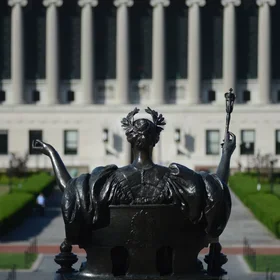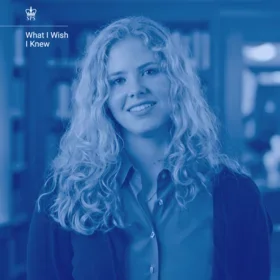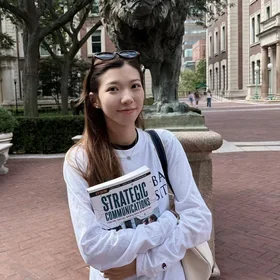Kyoko Adachi ('21SPS, Executive M.S. in Strategic Communication) is a Global Product Manager for Olympus Corporation, a leading provider of devices for the medical technology industry. As you might imagine, the past few weeks have been a busy challenge as the healthcare industry confronts the COVID-19 pandemic on the front lines.
“This crisis confirms just how interdependent we all are,” Adachi says. “As a large player in the healthcare system, in a matter of weeks we had to adapt the way that we operate internally and also with our global partners.”
Adachi’s work focuses on launching new products for worldwide distribution, informing healthcare professionals about our products, providing scientific and educational information, and supporting clinical research.
As a mid-career professional, she came to the School of Professional Studies in August 2019 to be a part of a cohort of seasoned leaders who would offer expertise and a critical lens to the coursework. Little did she know how important that coursework would become as she navigated the challenging waters of the COVID-19 crisis.
We caught up with her to learn more about her work and how what she is studying intertwines:
What drew you to the Strategic Communication program?
One of the initial draws was the smaller class sizes and the opportunity to maximize the interaction between faculty and peers. The world class Columbia faculty, relevant program curriculum, and my cohort of accomplished communicators with diverse professional perspectives has indeed created a rich learning environment.
What has life been like for you since COVID-19 entered the picture?
As a result of the quarantine I have found myself with ample time to think about the impact and implications of COVID-19. This crisis has created an important opportunity to reflect on questions such as, “What does it mean to go back to normal?” “What is the new normal?” As part of a cohort of Strategic Communicators in a time of uncertainty, I’ve critically examined how social media platforms are dominated by messages of fear, confusion and misinformation.
I’ve also observed narratives around human connection, hope and the power of working together. The most promising thing I have noticed is that, if done properly, communication can enrich people’s day-to-day existence by delivering connectivity, accurate information, and quality content. Communication is truly essential to human life.
The most promising thing I have noticed is that, if done properly, communication can enrich people’s day-to-day existence by delivering connectivity, accurate information, and quality content. Communication is truly essential to human life.
— Kyoko Adachi, '21SPS, Executive M.S. in Strategic Communication
Has your coursework informed any of your response to the crisis in your work life? In what ways?
Communication is a core leadership function. I lead a cross-cultural global team with a number of geographic and cultural challenges. I found The Reflective Leader course particularly helpful for this time of crisis. In this course I was able to discover my natural leadership style and explore a variety of styles and tools I can draw upon in the future.
Through experiential learning we were able to explore authentic leadership development and assess multiple leadership styles. Good leaders are self-reflective and practice different styles to match the situation at hand. This ability to adapt is critical in times of crisis.
What advice do you have for others leading communications during this time?
I would advise leaders to keep their messages narrow in subject matter yet high in volume during this time. Particularly when many employees are working remotely, constant and targeted communication is critical to the effectiveness of an organization. This also applies to external communication, as clients and other stakeholders are reassured by consistent, relevant, and timely messaging. Communication builds trust and it cannot be underestimated during this time.
I would advise leaders to keep their messages narrow in subject matter yet high in volume during this time.
— Kyoko Adachi, ‘21SPS, Executive M.S. in Strategic Communication
What is your hope for the future?
The more we communicate digitally in a culture dominated by screens and images, the easier it is to lose the human component that is so vital to what communication professionals do. I believe that the intersection of communication and technology is really about people.
From a professional standpoint, I hope to uphold the human perspective to make my organization stand out and maintain its competitive edge. In addition to feeling well prepared by my coursework, the executive student community at Columbia is exceptional. In my time here, I have found my cohort to be supportive, intellectually inspiring, and a lot of fun. I look forward to maintaining these connections and friendships as we move on in our careers.
Kyoko Adachi is a student in the Executive M.S. in Strategic Communication program. You can learn more about that program here.


